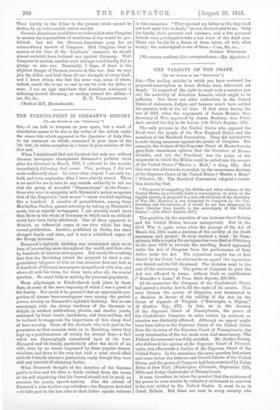THE TURNING-POINT IN GERMANY'S HISTORY.
rro THE EDITOR OF THE " SPEOTATOR."1
am loth to trespass on your space, but a word of elucidation seems to be due to the writer of the article under the above title which appeared in the Spectator of July 31st, to my comment on which, contained in your issue of the 7th inst., he takes exception in a letter in your number of the 21st inst.
When I maintained that not hundreds but only one solitary German newspaper championed Bismarck's political views after his dismissal in March, 1890, I referred to the months immediately following that event. This, perhaps, I aid not make sufficiently clear. In every other respect I can only up- hold, and even emphasize, what I have already stated, There is no need for me to turn to any outside authority to tell me that the group of so-called "Bismarekians" in the Press— those who were in sympathy with Bismarck's policy as against that of the Emperor's "new course "—never reached anything like a hundred. A number of pamphleteers, among them Maximilian Harden, gained notoriety by taking up Bistnarok's cause, but as regards newspapers, I can scarcely recall more than three in the whole of Germany to which such an attitude could have been fairly attributed. One of them appeared in Munich, an influential organ at one time which has long ceased publication. Another, published in Berlin, has since changed hands and aims, and is now a subsidized organ of the Krupp interests.
Bismarck's eightieth birthday was commented upon as an item of interesting news throughout the world, and thus also by hundreds of German newspapers. But surely the crushing fact that the Reichstag vetoed the proposal to send a con- gratulatory telegram to him on that occasion does not look as if hundreds of German newspapers sympathized with him, and above all with his views, for these were, after all, the crucial question. He cared little or nothing for personal popularity.
Many pilgrimages to Friedrieheruh took place in those days, at some of the more imposing of which I was a guest of the family. Nor could it be gainsaid that an appreciable pro- portion of sincere hero-worshippers were among the partici- pators, notably on Bismarok's eightieth birthday. But no one conversant with the strong tendency of the Germans to delight in outdoor celebrations, picnics, and similar jousts, enlivened by brass bands, bandoleers, and beer-swilling, will be inclined to exaggerate the importance of this cheap kind of hero-worship. Some of the students who took part in the procession on that occasion went on to Hamburg, where they kept up a pandemonium of revelry for several days—a fact which was disparagingly commented upon at the time. Bismarck and his family, particularly after the death of his wife, were by no means impressed by these popular demon- strations, and down to the very last took a most stand-offish attitude towards intrusive journalists, ready though they were with any amount of adulatory butter.
What Bismarck thought of the devotion of the German public to him and his ideas is fairly evident from the terms of his will stipulating that his funeral should not be made an occasion for yeasty speech-making. Also the refusal of Bismarck's sons to allow any outsiders—the Emperor included --to.take part in the last rites to their father speaks volumes
in this connexion. "They spurned my father in life, they shall not look upon him in death," his son Herbert said to me. Only the family, their servants and retainers, and a few personal friends were privileged to take a last leave of the dead man. There can hardly be a dozen of these latter, all told, alive to-day; the undersigned is one of them.—I am, Sir, &c.,
SIDNEY WHITMAN.
rWe cannot continue this correspondence.—En. Spectator.:1


































 Previous page
Previous page